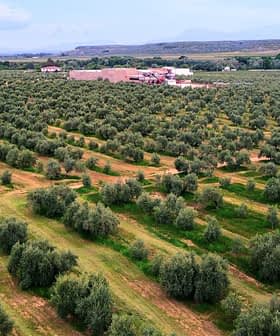Turkey Eases Export Ban Following Intense Lobbying

Officials in Turkey’s olive oil sector are expecting a bumper harvest in the 2024/25 crop year and are urging the government to lift its ban on bulk exports, which was partially lifted to allow for 50,000 tons of olive oil to be exported. The ban on bulk exports has caused prices to nearly double, hurting producers, exporters, and damaging Turkey’s reputation in export markets, with hopes to reach an export target of $1 billion in the upcoming crop year.
As officials in Turkey’s olive oil sector anticipate another bumper harvest in the 2024/25 crop year, they continue to call on the government to lift its ban on bulk exports.
After intense lobbying from the olive oil sector, the government partially lifted the prohibition, allowing producers to export 50,000 tons of olive oil in bulk until November 1, 2024.
The new crop expectations and stocks show us that we have approximately twice as much olive oil as we need in the domestic market. For this reason, we believe that bulk exports of olive oil should be liberalized.
According to the Aegean Olive and Olive Oil Exporters’ Association (EZZIB), Turkey has 200,000 tons of olive oil stocks. EZZIB chairman Mehmet Emre Uygun welcomed the decision, which he estimated would bring in $300 million (€279 million) for producers.
While producers, exporters and their advocates welcomed the announcement, they said it did not go far enough.
See Also:Native Varieties Yield Award-Winning Season for Turkish ProducersUygun said the bulk export restrictions, first imposed in August 2023, had not benefited consumers by lowering prices, which was the authorities’ goal.
Instead, Uygun said inflation had nearly doubled the price of olive oil during the ten months since the bulk export prohibition was announced. He warned that continuing the ban would hurt farmers, millers and exporters.

Mehmet Emre Uygun (Photo: EIB)
“While our exports were 150,000 tons in the 2022/23 crop year, they declined around 70 percent in the seven-month periods in 2023/24,” he told local media. “Exporters were not the only ones who suffered due to the injunction. The producer suffered a loss of income because he could not sell his products to exports.”
“Above all, Turkey and Turkish olive oil exporters lost their good reputation in export markets,” he added.
The August 2023 ban was the third prohibition on bulk exports in as many years, with previous bans implemented in March 2021 and April 2022. However, the current one has lasted longer than the earlier prohibitions.
Ali Kopuz, the chair of the Istanbul Commodity Exchange, said Turkey has twice the amount of olive oil it needs to supply the domestic market and called on the government to eliminate the ban.
“Bulk olive oil exports were banned, taking into account the yield and stock situation,” he told local media. “In this way, the domestic market was successfully regulated, and our [individually packaged] olive oil exports doubled compared to the previous season.”
“However, the new crop expectations and stocks show us that we have approximately twice as much olive oil as we need in the domestic market,” Kopuz added. “For this reason, we believe that bulk exports of olive oil should be liberalized.”
The EZZIB anticipates production to reach 400,000 tons in 2024/25, slightly below the record-high yield registered in the 2022/23 crop year but significantly above the previous harvest.
Combined with existing olive oil stocks and production from Afrin, a region in northern Syria occupied by Turkey, Uygun estimates that the country could have 650,000 tons of olive oil available by the end of the harvest.
“We wish for a season in which there are no quotas and out exporters can export in the world markets under fee marker conditions,” Uygun said. “If bans are left behind, we believe we will reach the export target of $1 billion (€932 million) for the first time in our history in the 2024/25 crop year.”









